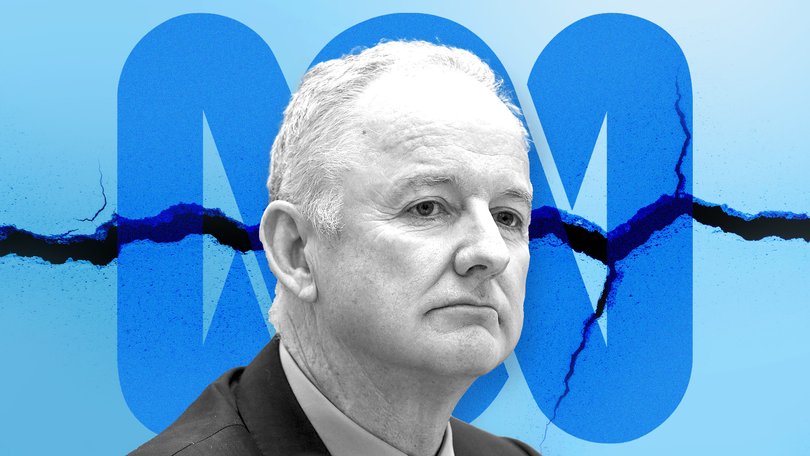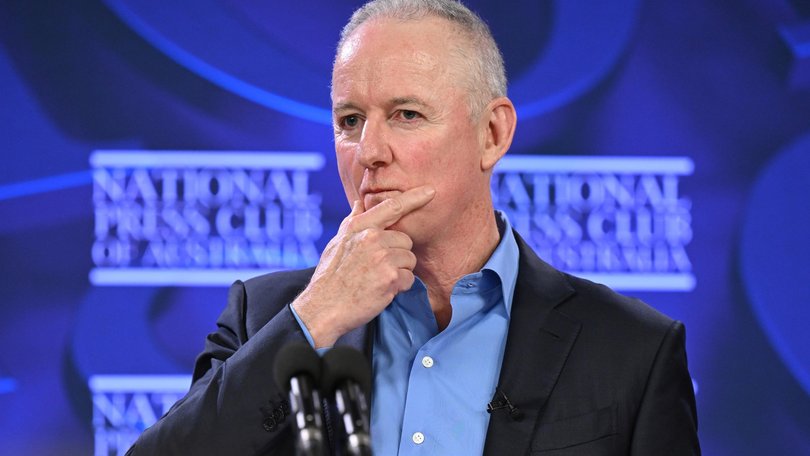Hugh Marks caught unaware by ‘Journo Feed’ proposal as ABC faces fresh scrutiny over costly Bluey blunder
The head of the ABC was forced to admit he knew nothing about a mysterious project to create a new interactive platform called ‘Journo Feed’ that would promote stories from individual reporters.

The head of the ABC has been left red-faced after appearing to know nothing about a mysterious project to create a new interactive platform called “Journo Feed” that would promote stories from individual reporters at the public broadcaster.
Hugh Marks insisted he’d “never heard about the proposal” — which has been shared internally with ABC staff — when asked about the project at the National Press Club in Canberra on Wednesday.
“I have never heard about the proposed ‘Journo Feed’. I’m not able to answer that question. I regret to tell you,” Mr Marks said before gesturing towards ABC news director Justin Stevens and suggesting he could shed light on the concept.
Sign up to The Nightly's newsletters.
Get the first look at the digital newspaper, curated daily stories and breaking headlines delivered to your inbox.
By continuing you agree to our Terms and Privacy Policy.“Justin is here. You can take it up with him later if you like.”
“I’m not aware of the secret project. It can’t be that good a project if I’m not aware of it. Things can happen without my knowledge but I like to be at the centre of things.”
Senior ABC figures later played down the project as a “thought bubble” to create an interactive in-platform experience to make it easier for the audience to follow an individual journalist’s work, rather than an established project set to be rolled out.
Despite Mr Marks being apparently unaware of the idea, ABC representatives urged The Nightly against describing it as a “secret project”, insisting it had actually been widely canvassed within the national broadcaster as part of a broader digital innovation discussions.
“Recently we shared with all ABC News employees, as well as other areas of the ABC, an Innovation Report that captures ideas bubbling up throughout the division and encourages more,” an ABC spokeswoman said.

“’Journo Feed’ was one of many interesting story format ideas in that, which are being further assessed.
“It’s an audience engagement idea designed to bring the public closer to the news gathering process.”
When asked if Mr Marks would now receive a briefing, and how many staff and what cost went into developing the project she added: “It isn’t a formal proposal, it’s one of many ideas in a report that was shared with all of the division”.
The ABC on Wednesday declined a request to release further details of the report despite sharing it to employees in the organisation.
Mr Marks had also spruiked ABC’s vertical video content across TikTok in his address — highlighting the work of ABC reporters like Lia Walsh and Claudia Long for their “incredible” social media tailored stories.
He also added that journalists were becoming “predator models” with dynamic skill-sets across all platforms.
“We’re going to need people that have different capabilities in the way they produce content. They become these predator models that do it all,” he said.
Mr Marks also used the appearance to tease that further announcements about the ABC’s content strategy would be released on Thursday.
“One option is we look at more short-form video for news on social. We’re ambitious about building tailored content approaches, not to social media in general but to each platform in particular reflecting the audience make-up and content style of each one,” he said.
He added that it would include lifting prime-time premium television series from 43 in 2025 to 60 next year and “a slate of new podcasts” and on-demand audio”, highlighting “vodcasting” as a popular offering.
He responded to questions about attacks on the ABC’s impartiality and bias from Sky News and The Australian newspaper — saying he didn’t want to get into “running commentary”.
“Everyone has their opinion about how well the ABC is performing — Fair enough. Some are running a narrative of decline and relevance. Let me tell you, they could not be more wrong. Consumption of ABC News is growing,” he argued.
“We are becoming more important. It’s just different. Performance must be measured on total audience. Engagement across all platforms must be measured by our impact on audiences over time.”
He said sharing content via multiple platforms beyond just previously TV and radio was allowing for the ABC’s work to have more longevity and a wider reach.
“You can make content audiences will discover, love and they’ll listen or watch it... maybe tomorrow or 20 years’ time,” he said.
In his wide-ranging address, Mr Marks also responded to ABC’s coverage of Donald Trump’s January 6 speech, the unlawful dismissal case of Antoinette Lattouf and ABC Four Corners reporter Mahmood Fazal co-hosting a gambling sponsored podcast.
He said the broadcaster had learned lessons from BBC’s crisis over a selectively edited version Donald Trump’s January 6 speech
“I think there are real lessons in that exercise,” he said.

“Stick to the journalism, the storytelling. I think that’s a really important lesson. I think the second thing... we have to not cower but we can’t be defensive when we make a mistake, own it.
“It’s not hard. People accept this is a fast-moving world. People expect journalism operates on a very fast cycle.
“Sometimes mistakes happen. When mistakes happen, we acknowledge them. We own them. We make the correction. We move on. We don’t defend at all costs.”
He added that Sky News coverage comparing ABC and BBC coverage was “opportunistic and false” and “any reasonable amount of work would have come to that conclusion”.
“I think the comparison of the ABC Four Corners to the BBC Panorama show was opportunistic. I didn’t accept that was legitimate criticism,” he said.
“I welcome reasonable scrutiny of the ABC and we should be subject to it and sometimes that will help us do better work.”
He also noted the unfair dismissal of journalist Antoinette Lattouf from the ABC, which ended in a costly court case, as an “error”.
Mr Marks also described the ownership model of popular children’s TV show Bluey as a “lost opportunity”.
“The BBC probably makes $300 million a year out of a property that was a joint BBC-ABC production but we should have been more active in the participation in what that was going to be,” he said.
“It’s a lost opportunity. But it’s happened. This is where we are. Let’s not make the same mistake again.”
